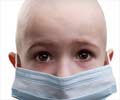Scientists at German Cancer Research centre have found a substance that could treat neuroblastoma, a tumor of the nervous system in children. The substance, HC-toxin is isolated form fungal plant pathogen. This substance from maize pathogen seems to reprogram neuroblastoma cells and make it behave like healthy cells.
Normally, the fungus Helminthosporium carbonum leads to reduced harvests for maize farmers. Yet a specific constituent of the pathogen, namely HC-toxin, might be very useful for medicine. The substance is used by scientists as a basis for developing a new anti-cancer drug. HC-toxin acts on enzymes known as histone deacetylases (HDACs), which structure the packaging of the genetic material, or DNA. HDAC enzymes change, among others, the histones – proteins around which the DNA is wrapped. Alterations in the packaging of the genetic material are suspected to cause cancer or promote its spread. Therefore, scientists are studying substances that inhibit HDAC enzymes for their ability to fight malignant tumors.Among these substances is HC-toxin, which has now been investigated by researchers of the Clinical Cooperation Unit “Pediatric Oncology” at the German Cancer Research Center (Deutsches Krebsforschungszentrum, DKFZ). They found out that neuroblastoma cells lose several of their cancer-typical properties when under the influence of the substance: They divide less frequently, show less invasive growth and even their outside appearance resembles healthy nerve cells again. These effects were observed to be stronger than with other HDAC inhibitors investigated previously.
The effect of HC-toxin is presumably based, among other things, on the fact that it promotes the function of an important cellular “cancer brake” known as RB signaling pathway. The investigators found out that the cancer brake was much more active in tumors cells that had been treated with HC-toxin than in untreated cells. They plan to conduct further research to determine whether the substance derived from the maize pathogen is suitable for developing a new drug to fight neuroblastoma.
Neuroblastoma is the second most frequent malignant tumor in children. With an average of 150 new cases diagnosed in Germany each year, neuroblastoma constitutes about seven to eight percent of all childhood cancers. Most affected children are in preschool age, one third are diagnosed under one year of age. Although treatment has been improved over the past few years, chances of recovery from advanced stage neuroblastoma continue to be very low. In addition, the drugs being used often cause serious side effects.
Source-Eurekalert
LIN/S







